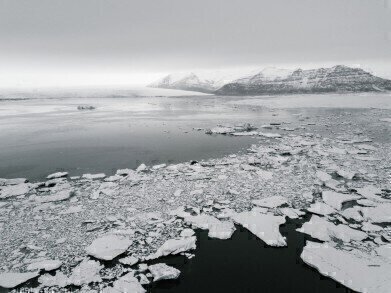Environmental Laboratory
18 Years of Satellite Data Proves Antarctica Is Melting Faster Than We Think!
Apr 04 2015
Antarctica is home to the coldest climate on the planet, with satellites recording bone chilling temperatures of up to minus 93 degrees. Yet despite being in the midst of a constant ice age, the latest research has shown that Antarctic shelves are melting at an alarmingly fast rate.
Back in 2009, we discussed a review of Antarctica's climate by the Scientific Committee on Antarctic Research (Scar), revealing the hole in the ozone layer has been protecting the Antarctic continent from the effects of global warming. However, new information has come to light.
Antarctica is melting faster than we think! Over the past 20 years, environmental scientists have confirmed that ice loss from Antarctica’s Pine Island Glacier has increased by 50%. As the shelves continue to melt, this could lead to accelerated sea level rises as they unlock larger ice sheets lodged behind them. In the long term this could mean metres of extra sea water which will spell disaster for low lying settlements.
Data from above
After analysing 18 years of satellite data a team of US scientists revealed that Antarctica’s floating ice shelves are losing a huge 310km3 of ice per year. One particular shelf lost 18% of its thickness, while over the past decade western shelf ice loss has increased by 70%. By the end of the century, scientists predict that it will have completely disappeared. While the melting of the ice shelves themselves doesn’t affect sea levels, the fact that they no longer prevent ice flows from the glaciers of east and west Antarctica from meeting the sea is a serious cause for concern.
Ice shelves melting at an unsustainable rate
According to Professor Andrew Shepherd of the Centre for Polar Observation and Modelling at the University of Leeds, the accelerated ice loss is simply not sustainable. “This is a real concern, because such high rates of thinning cannot be sustained for much longer, and because in the places where Antarctic ice shelves have already collapsed this has triggered rapid increases in the rate of ice loss from glaciers above ground, causing global sea levels to rise,” he explains.
Other environmental scientists agree that the melting ice shelves will create serious problems in the next 100 years. Dr Paul Holland, of the British Antarctic Survey has warned that if ice shelves continue to melt at the current rate, the entire west Antarctic ice sheet will collapse. For sea levels, this would mean a 3.5 metre rise.
Mankind or Mother Nature?
While it still remains unclear whether or not the accelerated ice loss is caused by man-made environmental damage or cyclical changes in ocean currents, the phenomenon will have significant consequences for the world as we know it. On the upside, Professor David Vaughan of the British Antarctic Survey maintains that the satellite data will play an important role in helping scientists make accurate and informed predictions regarding sea level rises in the future. He says that the “research is a significant step towards improving our ability to predict the future of the Antarctic ice sheet and its contribution to global sea level rise.” While we may not be able to halt or even slow the rate that Antarctic ice shelves are melting, we can use the data to develop management strategies for the future.
More from the Antarctic
For more fascinating stories about the Antarctic, read about how researchers demonstrated that, after over 1,500 years frozen in Antarctic ice, moss can come back to life and continue to grow.
Digital Edition
IET 34.2 March 2024
April 2024
Gas Detection - Biogas batch fermentation system for laboratory use with automatic gas analysis in real time Water/Wastewater - Upcycling sensors for sustainable nature management - Prist...
View all digital editions
Events
Apr 30 2024 Melbourne, Australia
Apr 30 2024 Birmingham, UK
May 03 2024 Seoul, South Korea
May 05 2024 Seville, Spain
May 06 2024 Minneapolis, MN, USA


















